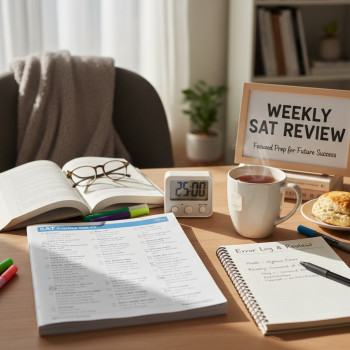Why Test Scores Are Only One Piece of the Puzzle
Take a breath. If your child has a Digital SAT score that’s great, celebrate. If their score isn’t exactly what you hoped, remind yourself—and them—that college admissions is broader than a single number. Admissions officers look for patterns: academic curiosity, resilience, contribution to community, and the ability to tell a compelling story. As a parent, your role is to help surface and shape that story.

Start with Emotional Support: The Foundation of Every Application
Admissions season can feel like a pressure cooker. Your calm presence can be the difference between overwhelm and focus. Emotional support isn’t just sentiment—it’s practical. When students feel safe, they think more clearly, write better essays, and make wiser choices about extracurriculars and course loads.
Concrete ways to provide emotional support
- Normalize setbacks. Share stories of times you didn’t get what you wanted and how you pivoted.
- Set realistic expectations. Encourage growth mindsets: effort and progress matter more than perfection.
- Protect sleep and routines. A rested brain writes better essays and performs better in interviews and classes.
- Keep conversations curiosity-driven, not judgmental. Ask: “What part of college excites you most?”
Shape a Holistic Application Plan
Think of the application as a mosaic. SAT scores are one tile; essays, recommendations, leadership, creative work, and demonstrated interest are other tiles. Collaborate with your teen to map out what their mosaic should look like by the time applications are due.
Steps to build the plan
- Create a timeline with milestones: draft essay dates, recommendation request deadlines, application submission targets, scholarship deadlines.
- Flesh out roles: who will proofread essays, who will organize recommendation requests, who tracks FAFSA and CSS Profile dates.
- Identify gaps—are there leadership experiences, summer programs, or project artifacts that would add depth?
- Consider targeted test retakes only if they fit the broader plan and don’t cause burnout.
Help Your Child Tell Their True Story Through the College Essay
Essays are where voice and character shine. As a parent, your instinct might be to edit every sentence—but the goal is to help your student show their authentic self, not your version of it.
How to be a helpful essay partner (without taking over)
- Ask open-ended questions: “What moment changed how you think?” or “Which experience do you keep returning to in conversation?”
- Help with structure, not voice. Suggest tightening, clarifying, and sharpening examples rather than rewriting paragraphs.
- Practice deadlines and accountability. Gentle check-ins (“How’s the essay draft going?”) beat directive micromanaging.
- Encourage vulnerability. Authenticity beats perfection every time.
Letters of Recommendation: Guide Your Teen to Strong Advocates
Recommendations provide first-hand perspectives on who your child is in a classroom and community. Parents can support the process by helping coordinate and prepare their teen and recommenders.
Actions that make recommendation letters better
- Encourage your teen to ask recommenders early—ideally at the start of senior year or earlier for early applications.
- Help your teen assemble a concise “brag packet”: a resume, a short note about the courses/projects they took with the teacher, and bullet points of achievements.
- Respect teachers’ workflows—ask in person if possible, then follow up with an email containing deadlines and submission instructions.
- Teach gratitude—have your teen send a thoughtful thank-you note once letters are submitted.
Extracurriculars: Depth Beats Breadth
Colleges prefer sustained commitment and leadership over a laundry list of fleeting activities. Parents can help by encouraging focus, enabling meaningful experiences, and helping showcase impact authentically.
Quality-focused extracurricular checklist
- Choose 2–4 activities to deepen rather than 10 shallow ones.
- Look for leadership opportunities—these can be formal (club president) or informal (founding an initiative).
- Document impact: hours, outcomes, testimonials, or a portfolio of work.
- Encourage projects that align with intended majors or personal passions.
Demonstrated Interest and College Fit
Many admissions teams weigh whether a student is likely to enroll if accepted. Demonstrated interest can be subtle—visiting campus, attending virtual info sessions, or thoughtful engagement with admissions staff. Parents can help make these interactions genuine rather than transactional.
Ways to show authentic demonstrated interest
- Visit campuses when possible and let your child absorb the campus vibe rather than treating visits like interviews.
- Attend virtual events—have your child ask one or two insightful questions rather than generic ones.
- Encourage follow-up emails to admissions counselors about specific programs or faculty that excite your teen.
Resume and Activity List: Presenting Achievements Clearly
Applications often have limited space. Help your teen prioritize impactful descriptions that are concise, outcome-focused, and include metrics where appropriate.
Resume tips parents can coach on
- Use action verbs (organized, led, developed, increased) and quantify results when possible.
- Include a brief 1–2 line description for each major activity explaining role and impact.
- Keep formatting simple; admissions readers skim quickly.
A Practical Table: Timeline Checklist for Parents
Use this at-a-glance table to keep key application steps organized. Dates may vary by school—adapt as needed.
| When | Action | Who Leads |
|---|---|---|
| Junior Year Fall | Begin college research, PSAT/Practice tests, explore extracurricular depth | Student + Parent |
| Junior Year Spring | Plan summer programs or projects; draft academic list | Student + Parent |
| Senior Year Summer | Draft personal statement, request recommendation letters | Student; Parent supports logistics |
| Senior Year Early Fall | Finalize college list, complete supplements, FAFSA/CSS Profile prep | Student + Parent |
| Application Deadlines | Submit applications; confirm recommendations uploaded | Student; Parent checks deadlines |
| Decision Time | Review financial aid offers, visit or re-visit campuses before deciding | Student + Parent |
Financial Aid and Scholarship Savvy
College affordability is often front and center for families. Parents should become partners in the financial planning process: learn the FAFSA timeline, understand institutional aid processes, and help your teen pursue scholarships that reward both merit and need.
Practical financial steps to take together
- Mark FAFSA and state aid dates on the family calendar the day they open each year.
- Gather documents early—tax returns, W-2s, and other income documentation—to avoid last-minute stress.
- Encourage scholarship applications that fit your child’s profile, including local community scholarships where competition may be lower.
Interviews, Portfolios, and Auditions: Preparing Without Overcoaching
Some programs require interviews, portfolios, or auditions. Parents can support preparation by creating a calm practice environment and offering logistical support without scripting answers or taking over creative work.
How to practice effectively
- Do mock interviews focusing on storytelling—why this major, what motivates you, what challenge shaped you?
- Review portfolios for clarity: include context for each piece and what the student learned.
- For auditions, ensure regular, realistic practice and rest before the performance—nerves undermine even the best-prepared students.
Mental Health: Prioritize Well-Being Over Checklists
Students who are emotionally healthy make better long-term choices. As a parent, know the signs of stress, offer coping strategies, and seek professional help if needed. Reducing anxiety around admissions may not speed up acceptance letters, but it will protect your child’s long-term wellbeing.
Supportive practices
- Normalize breaks, creative time, and social life—balance fuels academic productivity.
- Model stress management: deep breathing, short walks, or a digital detox evening now and then.
- Consider counseling or school mental health resources if anxiety or depression surfaces.
When and How to Talk About Test Retakes
If your teen has a Digital SAT score they want to improve, help them make a data-driven choice. Re-taking makes sense when a targeted study plan can reasonably deliver a clear boost—and when the effort doesn’t sap energy from essays or extracurricular commitments.
Questions to guide the decision
- How much did the student improve on practice tests after targeted review?
- Are test dates aligned with other application deadlines or major commitments?
- Could time invested in other parts of the application—like a major project or an essay rewrite—yield more value?
Leverage Expert Support When It Fits
Sometimes your teen will benefit from outside expertise—an essay coach, an admissions counselor, or targeted tutoring. If you choose that path, make sure the support complements your teen’s voice and goals. For example, personalized options like Sparkl’s one-on-one tutoring can provide tailored study plans, expert tutors, and AI-driven insights that target specific weaknesses without overwhelming the student. Use such services as a supplement, not a replacement, for family support and the student’s own effort.
Helping Craft Realistic, Aspirational Lists
Building a college list is both art and strategy. Aim for a balanced list of reach, match, and safety schools. Parents can be practical: help research admission rates, average admitted student stats, program strengths, and campus culture so choices reflect both ambition and fit.
Questions to explore together
- What majors and departments excite your teen, and what schools are known for those strengths?
- What campus sizes and locations feel emotionally and academically right?
- How will costs, scholarships, and potential aid packages affect decisions?
Celebrate the Small Wins—A Final, Powerful Role
Application season is long. Celebrate milestones: finishing a draft, submitting a recommendation, completing FAFSA. Those moments build momentum and keep motivation high. When outcomes arrive—acceptance, waitlist, or denial—be ready to celebrate persistence and plan next steps with compassion and pragmatism.
A Short Checklist Parents Can Use Tonight
- Ask your teen one open-ended question about why they want to go to college—listen without interrupting.
- Review deadlines together and mark three upcoming ones on the family calendar.
- Make sure the student has requested or scheduled any needed recommendation letters.
- Confirm FAFSA/CSS Profile documents are gathering pace.
- Encourage one restorative activity this week—an unplugged meal, a walk, or a movie night.
Closing Thoughts: Partnership Over Pressure
Parents who balance realism with encouragement give their teens a priceless advantage. The most compelling applications aren’t ones that check every box; they’re honest narratives about growth, curiosity, and contribution. By offering steady emotional support, practical organization, and—when helpful—select expert resources like personalized tutoring, you help your child show admissions committees who they truly are. That kind of advocacy matters more than one test score ever could.
Be the calm voice, the planner, and the cheerleader. Your partnership will help your teen move through this season with confidence and clarity—and set them up to thrive in the next chapter.













No Comments
Leave a comment Cancel